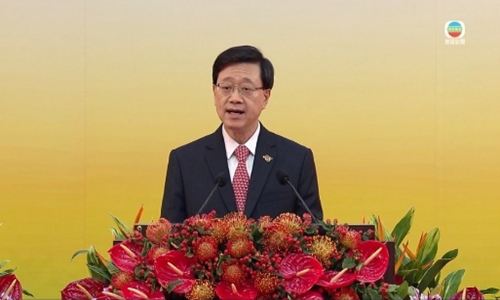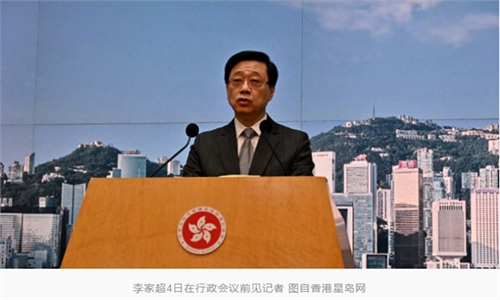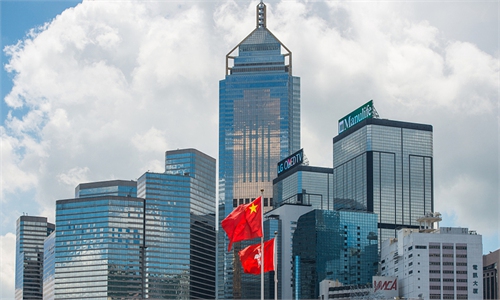HK chief executive backs arrest warrants for eight fugitives
High-profile law enforcement a 'move to safeguard national security'

John Lee Ka-chiu
Local authorities in Hong Kong vowed on Tuesday to "do whatever they can" to crack down on the activities endangering national security as a local court approved the issuance of arrest warrants for eight people including infamous anti-China rioters Nathan Law Kwun-chung and Ted Hui Chi-fung.
Some experts believed that such a high-profile way of law enforcement aims to deter those who engage in activities endangering national security both locally and overseas. The move is also in line with the country's broad efforts at enhancing the rule of law in foreign-related affairs, experts said.
The Hong Kong Police Force's national security department on Monday said that earlier, the city court had approved the issuance of arrest warrants for eight persons including Law, Hui and Dennis Kwok Wing-hang, who have fled overseas and allegedly contravened the National Security Law for Hong Kong, and the persons at large are wanted by the police.
The police in the Hong Kong Special Administrative Region (HKSAR) are offering HK$1 million ($127,627) in rewards for each of the wanted persons, which is valid until July 2, 2024. It also called on the eight persons to come back to the HKSAR and turn themselves in, so as to get reduced sentences.
The issuance of arrest warrants is a fulfillment of responsibility and an act of safeguarding national security, which the HKSAR Chief Executive John Lee Ka-chiu fully supports and endorses, according to a press conference on Tuesday.
"The only way to avoid being wanted is to surrender, and surrendering can lead to a reduced sentence, otherwise, they will have to worry about being arrested every day, living in fear," Lee said.
Besides putting the related fugitives on the wanted list, it is also necessary for authorities to cut off their funding chains, which include freezing, restricting, confiscating, and seizing their assets, and identifying their contacts, accomplices, and financial backers both in Hong Kong and abroad, Secretary for Security of Hong Kong Chris Tang Ping-keung told a press briefing on Tuesday.
Anyone who assists, incites, or financially supports these individuals to continue activities that endanger national security may be in violation of the law, Tang warned. Furthermore, if one knowingly continues to crowdfund these individuals despite their actions that threaten national security, they might also be breaking the law, the official said.
Lau Siu-kai, a consultant with the Chinese Association of Hong Kong and Macao Studies, pointed out that the high-profile warrants are intended to make Hong Kong residents understand that the city still faces serious national security risks, and to deter those who engage in activities endangering national security both locally and overseas.
"External forces are still using overseas anti-China disruptors as pawns to attack Hong Kong and China, and Western countries are backing and shielding these disruptors," Lau said.
In response to some criticism made by the Western countries including the US and the UK over the arrest warrants, the Chinese Foreign Ministry spokesperson Mao Ning said on Tuesday that relevant countries should respect China's sovereignty and the rule of law in the HKSAR, stop backing and recruiting those who cause chaos in the HKSAR against China, and cease harboring criminals.
"Justice will not be late, nor will it be absent," Mao said, noting that the issuance of arrest warrants is a necessary step to defend the authority of the National Security Law for Hong Kong and national sovereignty, to consolidate the city's progress from chaos to governance, and to guarantee its long-term stability and peace, which conforms to international law and common practices.
In fact, before the establishment of the National Security Law for Hong Kong, the city already had some ordinances with extraterritorial legal effect, such as bribery, conspiracy or instigation of murder, and Class A and Class B offenses specified in the Criminal Jurisdiction Ordinance. Most of these laws in Hong Kong with extraterritorial legal effect were transplanted from British law in the colonial era, Louis Chen, a member of the Election Committee and general secretary of the Hong Kong Legal Exchange Foundation, told the Global Times on Tuesday.
Regardless of whether it is the common law system or the civil law system, some provisions, including those for maintaining national security, have extraterritorial jurisdiction. Therefore, those returning to Hong Kong should also be subject to legal sanctions, Chen said.
Currently, all the wanted fugitives are overseas, which has sparked discussion about whether they could be held accountable in accordance with the law.
The city currently has agreement for the surrender of fugitive offenders with 10 countries including South Korea, Portugal and Singapore, and the national security laws of all countries have extraterritorial effect, Chen noted. "The police attach great importance to the current pursuit of the eight fugitives and there is certainly room to prevent the suspects from escaping," he said.



